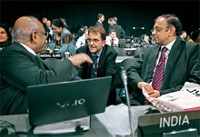Advertisement
Grab your lab coat. Let's get started
Welcome!
Welcome!
Create an account below to get 6 C&EN articles per month, receive newsletters and more - all free.
It seems this is your first time logging in online. Please enter the following information to continue.
As an ACS member you automatically get access to this site. All we need is few more details to create your reading experience.
Not you? Sign in with a different account.
Not you? Sign in with a different account.
ERROR 1
ERROR 1
ERROR 2
ERROR 2
ERROR 2
ERROR 2
ERROR 2
Password and Confirm password must match.
If you have an ACS member number, please enter it here so we can link this account to your membership. (optional)
ERROR 2
ACS values your privacy. By submitting your information, you are gaining access to C&EN and subscribing to our weekly newsletter. We use the information you provide to make your reading experience better, and we will never sell your data to third party members.
Policy
Copenhagen Call For Action
Climate Change: Negotiators sweat the details as clock ticks down
by Cheryl Hogue
December 21, 2009
| A version of this story appeared in
Volume 87, Issue 51

Leaders of more than 100 countries gathered in Copenhagen last week to call for a new global agreement for fighting climate change. While they spoke, negotiators worked feverishly behind closed doors to iron out contentious issues and finish a deal that would lead to a legally binding climate treaty in 2010.
“The negotiations have been fraught, time-consuming, and often difficult,” summed up Mohamed Nasheed, president of the Maldives, a low-lying island nation at risk of inundation due to rising seas. “No one expected such a historic endeavor to be easy.”
At C&EN’s deadline, the talks were expected to produce an agreement by Dec. 18 or 19. Contentious issues that have dogged the climate negotiations for the past two years threatened to leave a stalemate in Copenhagen. But countries pledged to plow through their differences and broker a compromise before the meeting ended.
One major focus of the talks involved how much industrialized countries and emerging economies would have to cut their greenhouse gas emissions.
Another major issue revolved around how much financing rich countries would provide to help the developing world adapt to the effects of global warming and to install greener energy technology that limits greenhouse gas emissions.
As the conference drew to a close, Secretary of State Hillary Rodham Clinton announced that the U.S. would join with other industrialized countries in providing $100 billion per year in climate-related assistance to the developing world by 2020.
C&ENtral Science Blog
“For the first time, the U.S. has publicly stated support for long-term global funding for developing-world adaption and mitigation to climate change,” said Martin Kaiser, Greenpeace International climate policy adviser. However, Kaiser faulted the U.S. for failing to put an actual dollar figure for its contribution on the table.
Clinton stressed that the U.S. offer would apply only if it were incorporated into a global agreement that includes two key provisions. One, Clinton said, is meaningful emissions limitations by emerging economies such as China, India, and Brazil. The other is a requirement for countries to provide reports on their emissions actions to the world community for review and verification—conditions that negotiators in Copenhagen refer to as transparency.
Fred Krupp, president of the advocacy group Environmental Defense Fund, applauded Clinton’s focus on these conditions. “Transparency—knowing whether countries are living up to their commitment—is the linchpin of an effective global effort,” he said.
China, however, has resolutely rejected the idea of international verification of its voluntary domestic pledge to reduce its energy intensity—the amount of energy it uses per unit of gross domestic product—by 20% of 2005 levels by 2020. After Clinton’s announcement, however, He Yafei, Chinese vice minister of foreign affairs, indicated that his country would be willing to “enhance” communications about its emissions limitation efforts to improve transparency. He did not elaborate.
Industrialized countries have also offered to provide short-term financing to the developing countries that are most vulnerable to climate change. The goal is to provide $10 billion annually, starting in 2010.
Many of the world’s poorest countries, including several African nations, say the $10 billion-per-year figure isn’t nearly enough to help them deal with the effects of human-induced climate change.
“The short-term figure is woefully inadequate,” said Bruno Sekoli, Lesotho’s chief negotiator. “It is not based on a serious economic assessment of the true harm that climate change is having on poor countries.”





Join the conversation
Contact the reporter
Submit a Letter to the Editor for publication
Engage with us on Twitter